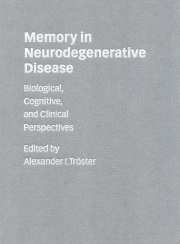Book contents
- Frontmatter
- Contents
- List of contributors
- Preface
- PART I Biological perspectives
- PART II Cognitive perspectives
- PART III Clinical perspectives
- 14 Biological and psychosocial risk factors for dementia and memory loss
- 15 Cross-cultural issues in the neuropsychological assessment of neurodegenerative disease
- 16 Psychometric issues in the clinical assessment of memory in aging and neurodegenerative disease
- 17 The role of memory assessment in the preclinical detection of dementia
- 18 Clinical differentiation of memory disorders in neurodegenerative disease
- 19 The impact of depression on memory in neurodegenerative disease
- 20 Preserved cognitive skills in neurodegenerative disease
- 21 Drug treatment of cognitive impairment in neurodegenerative disease: rationale, current experience and expectations for the future
- 22 Surgical interventions in neurodegenerative disease: impact on memory and cognition
- 23 Memory dysfunction in neurodegenerative disease: ethical and legal issues
- 24 Memory in neurodegenerative disease: clinical perspectives
- Index
20 - Preserved cognitive skills in neurodegenerative disease
from PART III - Clinical perspectives
Published online by Cambridge University Press: 23 November 2009
- Frontmatter
- Contents
- List of contributors
- Preface
- PART I Biological perspectives
- PART II Cognitive perspectives
- PART III Clinical perspectives
- 14 Biological and psychosocial risk factors for dementia and memory loss
- 15 Cross-cultural issues in the neuropsychological assessment of neurodegenerative disease
- 16 Psychometric issues in the clinical assessment of memory in aging and neurodegenerative disease
- 17 The role of memory assessment in the preclinical detection of dementia
- 18 Clinical differentiation of memory disorders in neurodegenerative disease
- 19 The impact of depression on memory in neurodegenerative disease
- 20 Preserved cognitive skills in neurodegenerative disease
- 21 Drug treatment of cognitive impairment in neurodegenerative disease: rationale, current experience and expectations for the future
- 22 Surgical interventions in neurodegenerative disease: impact on memory and cognition
- 23 Memory dysfunction in neurodegenerative disease: ethical and legal issues
- 24 Memory in neurodegenerative disease: clinical perspectives
- Index
Summary
INTRODUCTION
Progressive dementing diseases, regardless of their etiology, are associated with a relentless loss of cognitive capability in many domains, which in turn is associated with demonstrable and varied neuropathological changes, most of which are irreversible. From this perspective, it is not surprising that extensive research effort has been devoted to the careful description of the various cognitive and neuropathological changes that occur in both Alzheimer's disease and in vascular dementia. Because the changes that occur in the brain with these diseases are cumulative and eventually result in marked tissue loss, current conceptions about the nature of cognitive deficits have implicitly or explicitly assumed that these deficits arise because the necessary information to perform the cognitive functions is simply ‘gone’, on account of the neural substrate being either absent or hopelessly ‘scrambled'.
Against this background, demonstrations that some demented patients retain the ability to perform some complicated activities quite well even though they apparently can no longer perform simpler functions competently pose fascinating theoretical questions, which in turn may have important practical implications. In this chapter we review the literature on preserved cognitive skills in dementia. As a prelude, it is desirable to consider what is known about the status of everyday cognitive skills in normal aging and in amnesia. Finally, the literature on savants is also reviewed briefly because savants, like some demented elderly patients, also exhibit exceptional cognitive abilities against a background of globally impaired intellectual functioning.
NORMAL AGING
Age-related declines in performance have been carefully documented on tests of sensory acuity, psychomotor speed, recent memory, attention, visuospatial and visuoperceptual abilities and forming novel concepts (Flicker et al. 1986; Salthouse 1989, 1990).
- Type
- Chapter
- Information
- Memory in Neurodegenerative DiseaseBiological, Cognitive, and Clinical Perspectives, pp. 338 - 348Publisher: Cambridge University PressPrint publication year: 1998
- 1
- Cited by



